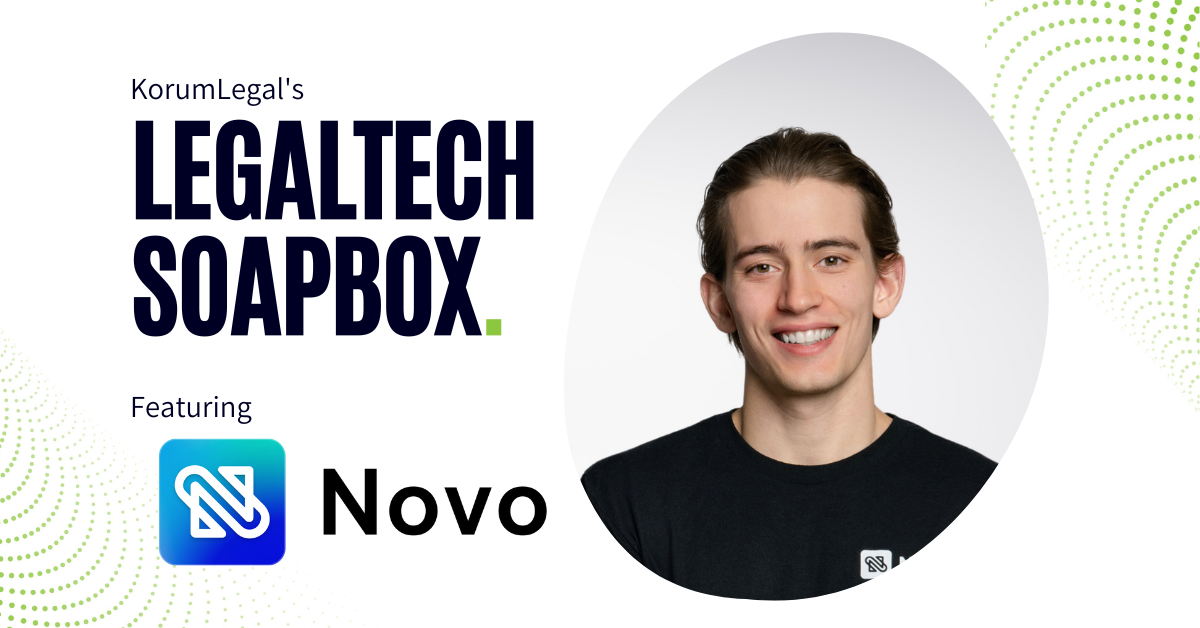LegalTech Soapbox: Strengthen your daily operations with Novo.

1. Hi Charles, tell us the story behind Novo.
In 2023, my co-founder and I became fascinated with generative AI and the impact it could have on the legal industry. We dove in headfirst and built our first prototype, a chatbot that helped attorneys conduct legal research faster. Despite the fact that the first version of Novo was built in our garage, so to speak (we used open-source AI models and publicly available legal data), it worked quite well to help users quickly find relevant case law.
It didn’t take long for us to realise that many law firms weren't interested in working faster, because it would significantly reduce their billable hours! Most firms we talked to would dance around this topic, but a few said it explicitly. One in particular said "We think what you've built is really fascinating, Charles, but we're not sure how we can justify the spend if the net result means we're billing less hours to the client." Talk about a perverse incentive!
We quickly discovered there was a type of law firm that was ready and willing to embrace the technology - personal injury firms. Once we narrowed our focus exclusively to PI, we rebuilt the product from scratch to solve their biggest problems, and that's how Novo became what it is today.
2. What are the services or products that Novo provides?
Novo helps personal injury firms write medical chronologies and demand letters in just a few minutes using AI. Most firms do this by hand - paralegals will read through thousands of pages of records, carefully catalogue all of the injuries, treatments, and bills, build that into a summary so the firm can put a value on the case, then write a demand letter by hand to ask the insurance company for settlement. That whole process is slow, manual, and can take days to complete.
Novo helps our users write comprehensive med chrons and demand letters in just a few minutes.
3. How does the above optimise the daily operations of an in-house legal team/ law firm?
PI firms are held back by the complexities of pre-settlement. These challenges drive up overhead costs, increase the time it takes to settle, and cause cases to settle for less. Novo replaces this experience with a 'settlement engine', and helps firms save money, settle cases faster, and get the maximum settlement for every case.
4. What do you believe will be the most significant change in how in-house legal teams use technology in the next 10 years?
Artificial Intelligence is already transforming the day-to-day operations of law firms, with more and more adopting a litany of different AI tools. The bigger and less obvious question is: What are the long-term downstream effects on the legal industry as a whole?
The biggest change that's already taking place is that the work of support staff - I'm talking about paralegals, legal assistants, and case managers - is going to be supercharged by AI. The output of paralegals and legal assistants is going to continue to rise exponentially, until a few people enabled by AI can perform the work of hundreds of people working by hand. While PI firms are proving to be the earliest adopters of AI, even the less innovative firms won't want to miss out on the efficiency gains.
What are the downstream implications? For starters, it will allow attorneys to spend more time doing what attorneys do best - thinking deeply about how to argue the law, spending time with clients, and using the finely-sharpened skills they've been developing over the years. Attorneys don't want to be bogged down with managing support staff, gathering the facts for a case, or doing work that could be done by non-lawyers. This wave of AI is going to free them to spend time on work that’s more meaningful to them and their clients.
Over the long run, this gain in efficiency is going to increase the supply of legal work, and thus, allow more people to access legal representation than they could before. This will be a massive gain for the legal industry as a whole. The Jevons paradox, which is widely discussed in the AI world lately, is the idea that increased efficiency leads to increased consumption, rather than decreased consumption. That's exactly what's going to happen across the legal world–from PI to business litigation to IP law and even to the AM Law 200.
The net result is that the public as a whole will have more affordable access to legal representation, and that's a future we can all look forward to.
Lily Evans and Charles Porges
Jun 11, 2025
Related Posts.
By: Lily Evans and Lissa Montisano-Koen
This month, our KorumLegal Consultant isLissa Montisano-Koen, an accomplished In-House Corporate Counsel with over 15 years of experience advising Fortune 500 multinational corporations. Lissa..
By: Lily Evans and Laura Hannon
GC Spotlight: Laura on how LegalTech can optimise LegalWork
Laura, a corporate lawyer by background, heads up the legal and compliance team at MoneyHero Group (NASDAQ: MNY), a market leader in the online personal finance aggregation and comparison sector in..
